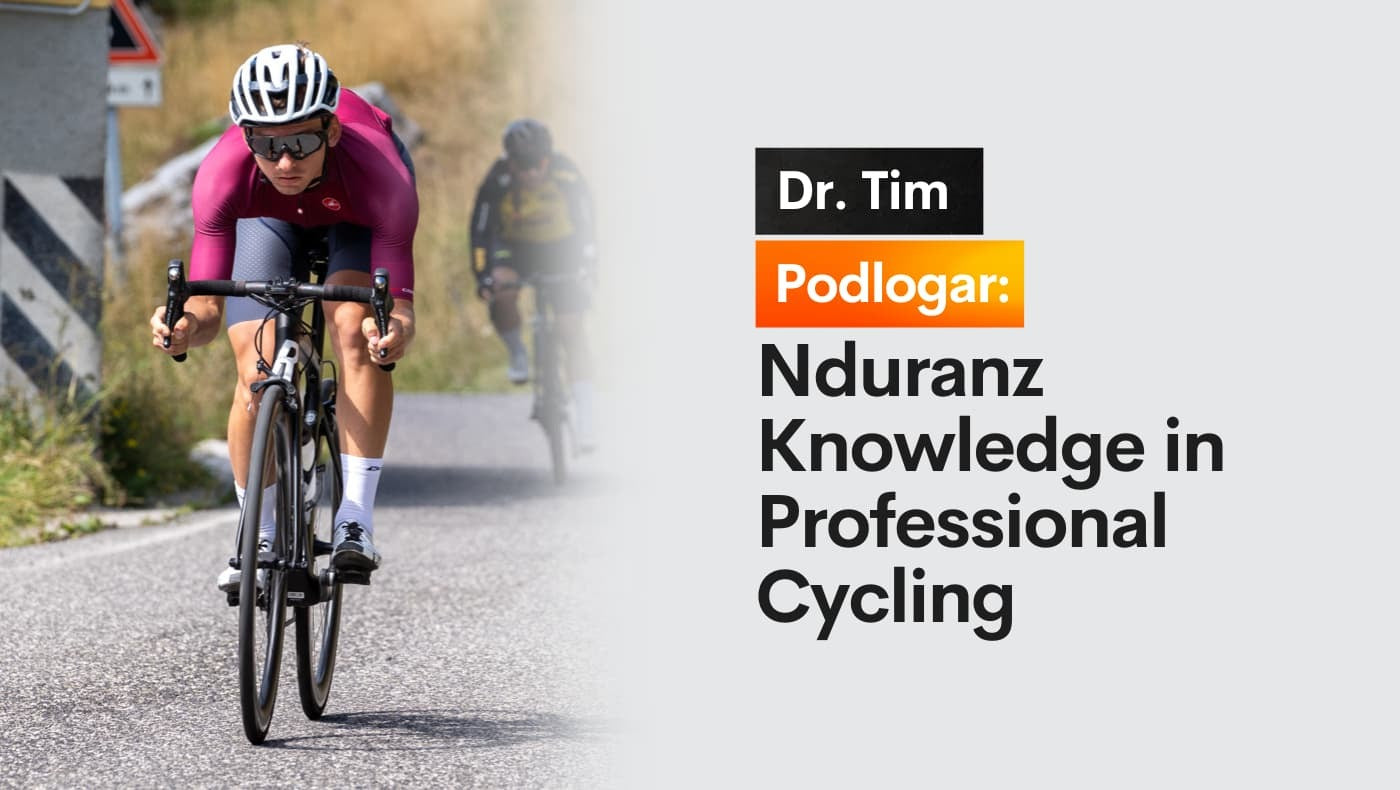We sat down with our Head of Research and Development, Dr. Tim Podlogar, to discuss nutrition for sports cycling.
Nutrition During a Stage Race
Tim, what is the average diet of a professional cyclist at the Giro d'Italia?
The most important meal is breakfast. It is based on carbohydrates but, since the race begins later in the morning, the breakfast is balanced with all nutrients.
During the race itself, cyclists have a very high intake of carbohydrates. We're not talking about just 40 to 60 grams per hour, but much more. Most teams these days try to reach 120 grams per hour. They want to minimize muscle damage in every stage and allow the athletes to have enough energy when they reach the goal.
At the finish line, cyclists immediately have a recovery drink with carbohydrates and protein. That is followed by smaller meals. In the evening, they also have dinner, which is the largest meal after breakfast.
What do they consume during the race?They need an intake of 5000 to 6000 calories, which are mainly from carbohydrates from energy gels, energy bars, sports drinks, or a combination of solid foods. It depends on what a cyclist prefers.
Also read: How many calories do professional cyclists burn during races?
Recovery and Meal Timing
Why is recovery so challenging during stage races?
The body is in a catabolic state for 5 to 6 hours daily during a stage race. Even if you ingest 90 grams of carbohydrates per hour, it only makes up for a small portion of energy burned during the race, so glycogen stores are depleted. Glycogen stores takes 24 hours to replenish. But, in stage races, you don’t have 24 hours between stages, so it’s difficult to recover fully each day.
The difference between a cyclist who wins one race and the one who wins for three weeks in a row is their ability to recover. Even one stage race drains you for a long time. Without recovery, performance in future races would start to decline.
For recovery, what’s the difference between one large meal and several smaller meals?
The most important thing is to get protein and carbohydrates after training to initiate recovery. After that, it doesn’t matter much whether you eat one large meal or several smaller ones—it all gets absorbed eventually.
What do you think of Coca Cola or Fanta for recovery?
We try to avoid those, as we want the recovery meal to contain protein. However, Cocoa Cola and Fanta are not really problematic because they contain regular sugar. After an exhausting stage, sugar is essential for athletes. The only thing missing is protein.
I am not a fan of plant sources of protein because they don't have a complete amino acid profile. It is possible to create a quality meal out of plant sources of protein, but you need to put more thought into it.
There are vegan athletes who are successful, but they need to be extra careful how they plan their food to get all the nutrients. If you eat animal-based food, there is a smaller chance of making mistakes.
Advice for Serious Amateur Athletes
What nutrition advice would you give to serious amateur athletes?
Nutrition for training is all about managing the intake of macronutrients--enough protein, carbohydrates, and not too many fats.
Fundamentally, the most important thing is the energy availability. If this is taken care of, training performance will be good.
What about during training camps?Amateur training camps are like stage races for pros. Everything should revolve around carbohydrates. Keep it as simple as possible. There’s point in selecting “healthy” meals.
Do amateurs also need more than 60 grams of carbohydrates per hour? Or do they waste anything above 60 grams per hour?
Professionals have much greater energy demands than amateurs. However, more carbohydrates can be used per hour if there is a demand for it. So yes – amateurs should often go higher than 60 grams per hour.
Key Misconceptions in Sports Nutrition
Are there many misconceptions in the world of sports nutrition?Yes, and they are increasing because of the social media. Theories can easily reach individuals, and even top-level athletes.
What is the most dangerous misconceptions in sports nutrition?
Surely the idea that carbohydrates make you gain weight. This is the biggest misconception, and I deal with it daily. Carbohydrates won’t make an athlete gain weight; they allow them to train more efficiently. Weight gain happens if the entire energy intake is too high, not because of carbs alone.
I should not have to discuss with a top-level athlete why they need to eat carbohydrates. They are not an ordinary person who walks just 3000 steps per day. They need three to four times more energy in a day than an ordinary person. This is why the nutrition for athletes is not the same as the nutrition for normal people.
If we take 2000 calories of healthy food, when we have a lot of vegetables and unprocessed foods for lunch and dinner. This diet works for someone who doesn't do much throughout the day, but if we apply this to a top-level athlete, who has a three times higher need for energy and must eat three times more food, you'd get a huge amount of food that would be difficult to ingest and too much fiber that the body cannot digest normally.
Science and Industry Trends
How has sports nutrition evolved in recent years?
In the period between 2000 and 2007, the era of Lance Armstrong, everything was based on doping, then training, and nutrition was third.
Then the cycling team Sky arrived around 2010. They were the first to have a kitchen with them, and they paid attention to nutrition in regards to quantities.
Now, we have competing ideas. We have one branch dealing with micronutrients, thinking that these will improve performance. In other branch, we have scientists like myself researching carbohydrates and ratios.
Why do you think micronutrient research is less important?The problem of scientists is their reductionist view on science. They only see their problem, what they are researching, but they don't see the big picture.
Instead, they deal with stuff like cellular mechanisms on isolated muscle fibers. And supplements are always studied in isolation, usually in suboptimal conditions or suboptimal comparison groups. It's difficult to apply this knowledge on a living organism in a sports environment.
You need to see the athlete as a whole. If you were to sum all the promised improvements, 1% from caffeine, 2% from nitrates, etc., you'd have to see a 50% performance improvement, but this never happens.
You are the Head of Research and Development for Nduranz. How is Nduranz different?Nduranz may be the first brand that understands why fructose is useful, and in what amounts it should be used. They incorporate this throughout their entire product line to provide athletes everything they need. Nduranz also doesn't complicate nutrition where there is no need to complicate.
Why do you think some brands lag behind in adopting scientific research?
Everyone says that science is behind practice. In reality, practice is behind science.
Science has the answers to the questions, but coaches and athletes are unable to access this knowledge. And manufacturers often seek solutions in things that may not be important. They focus on details but neglect the fundamentals.
For example, manufacturers might focus on the type of maltodextrin in their product, but neglect the ratio of maltodextrin and fructose, which is a lot more important than the type, as there is no research to show that the type of maltodextrin has any influence.

Future of Sports Nutrition
What’s next for sports nutrition?
I see a future with more individualized approaches. I'm exploring the idea of adapting carbohydrate intake during physical activity to what an athlete actually absorbs and uses, not to have just a general recommendation of 90 grams of carbohydrates per hour for everyone.
What’s the next thing research needs to explore?
The next thing to explore is what happens once we move out of the lab. Currently, all research is done in a lab with 18 degrees C, 30% humidity, and controlled conditions. Things fall apart once we reach extreme conditions, hypoxia, when we enter heat.
We have to do more research to better understand what exactly happens and how to prevent it.

